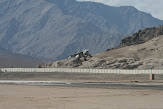The advent of various ethnic groups in India demanding separate administrative states within India, for their social and political well being has created an equal number of arguments and counter-arguments on the topic. While the proponents of the separate state theory claim, political and economic neglect by their parent states on the basis of ethnic and linguistic dissimilarities, the opponents argue that creation of more states will go against the whole argument of a United India. Many have argued in length about how the previous generations of leaders made a historic blunder by creating states on the basis of linguistic lines and thus paving the way for future Balkanization of India. People have argued that this should not be allowed to proceed, and should be stopped immediately to prevent jeopardizing the integrity of the nation.
What one fails to see is that it was these very policies of separate states that were able to hold the Indian Union strongly in one of the most testing times for the country. It has been well documented that during and after 1971, secret transcripts of conversation between US president and his Secretary of State had predicted a disintegration of India in no time owing to the diverse ethnic, linguistic and economical fabric of the Indian society. And here we are today, more than 6 decades after our Independence, and moving ahead with a strong economy whereas even the so called super power is reeling through crushing economic times. One needs to look back in history and judge how Tamil Nationalism was contained after they achieved Self-determination in the 1960s. One needs to see and judge how Naga and Mizo movements for secession were contained by granting them Self-determination in the 1980s. The list is endless, and yet we fail to see the most important lesson in it all. That cultural nationalism is an un-alienable part of any community, and yet this can be contained by the right to self-determination as enshrined within the constitution of our country. It is the very reason, ‘that our Constitution is so accommodating to these aspects of democracy’ that we have been able to overcome the greatest challenges to our existence.
The idea of a unified Indian union with only administrative divisions, and no linguistic or ethnic connotations is a very novel one, but impractical. Everybody agrees to the idea of one unified identity of India above all other identities. The problem is in accommodating every community’s aspirations within the single unified image of India. Can a Hindi speaking gentleman from the North of the country accept Tamil to be the Official language of India? Will a Malyali speaking lady from South of the country accept Bengali script as the official writing script for India? The list again is endless. The idea of a unified Indian identity is impractical in domestic affairs; this notion is good in paper but impractical considering the size, diversity and economic disparity of the country. Neither today nor before, could we ever have two diverse Indians from differing ethnicity in one room and expect them to have a cordial exchange of views on the others cultural brilliance. The list is endless. This is a fact we have to live with, and not deny it.
If people want to really understand what would have happened to India if the present number of states were not created in Independent India, one should look at the disparate state of affairs today Pakistan is in. The divisions and feelings of one community’s cultural dominance over others is so much there that only the Army has been able to stop the divisive sentiments of the people there. One must not forget that the creation of Bangladesh was due to a feeling of cultural dominance of the Bengali speaking Pakistanis by the West Pakistani Punjabis in that country. The Pakistanis had adopted the idea of a unified Pakistani federation based on a Pan Islamic identity and yet Islam could not hold two diverse ethnic races together. One can only predict what this can do to the already fragile religious and linguistic fabric of Indian society.
Given the size, diversity and economy of India, had we not created so many states, and thus the feeling of self-rule and respect among the various ethnic groups in our country, Pakistan would have surely used the fault lines which would have been created because of that resentment, to fuel an even bigger internal strife in India and thus weaken the whole Union of India. This was indeed exploited by it, and the examples are there for all to see.
We have to understand that while such paper book ideologies are brilliant on paper and in countries such as the U.S.A, (whom we look upon as the most perfect country on Earth) the same philosophy and ideology can create the downfall for India. What works in the West cannot work here in India. As it has been said, we are a very different country with great diversity, it is imperative that we understand and satisfy the needs, social, political and economical of all our diverse residents to build a strong India. It is for these reasons that our great and visionary leaders laid a foundation for creation of different states based on linguistic or cultural or socio-economic lines. One must appreciate the visions shown by those great leaders in bringing about the constitution of our country, which is so accommodating to the extent that we have been able to fight against all odds to preserve this national integrity of our nation without having to resort to anything else outside the framework of our democracy. Ultimately the National integrity of our nation is of utmost importance but at the same time ignoring the aspirations of its people will never yield an integrated nation. The two need to go hand in hand.
Tuesday, March 10, 2009
India - Its states and its people
Posted by Anant Dhamala at 12:04 AM
Subscribe to:
Post Comments (Atom)










1 Comment:
Brilliant post!
Post a Comment